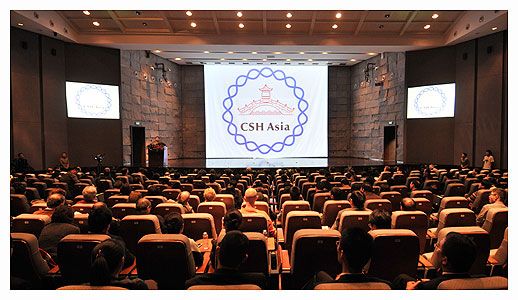Cold Spring Harbor Asia Conference on Epigenetics, Chromatin & Transcription: Jin-Qiu Zhou
As part of its mission to encourage engagement within the genetics community, PLOS Genetics is sponsoring a number of conferences and meetings this year. In order to raise awareness about these conferences and the researchers who attend them we are featuring a number of these conferences on Biologue, with posts written by the organizers or PLOS Genetics editors who are involved.
The second of these conferences is the third Cold Spring Harbor Asia Conference on Epigenetics, Chromatin & Transcription, which takes place in Suzhou between the 5th and 9th of May. We hear from Jin-Qiu Zhou, PLOS Genetics Associate Editor and Principal Investigator of the Institute of Biochemistry and Cell Biology, about why he is attending the conference, and the aspects of epigenetics that he finds exciting.
Work in Jin-Qiu Zhou’s Lab
The long-term goal of my lab is to understand the processes by which eukaryotic cells faithfully maintain their chromosomes to avoid chromosomal instability. Currently, most of our work has been focused on the structure, function and replication of telomeres, mainly using baker’s yeast as a model. We use a combination of genetic, biochemical and cell biological approaches to address:

(1) how telomere length and structure are maintained, and the biological relevance of telomere regulation to genome stability and cellular aging;
(2) how a cell establishes the boundary between the telomere silent chromatin and adjacent active chromatin to prevent the telomeric heterochromatin spreading;
(3) the epigenetic codes and information that are employed when telomere replication or DNA double-strand break occurs;
(4) the molecular basis for telomere-length-dependent or -independent cellular aging.
The CSHA Conference
Epigenetics is the study of heritable changes in gene activity that are not caused by changes in the DNA sequence. It also can be used to describe the study of stable, long-term alterations in the transcriptional potential of a cell that are not necessarily heritable. Unlike simple genetics based on changes to the DNA sequence (the genotype), the changes in gene expression or cellular phenotype of epigenetics have other causes. Examples of mechanisms that produce such changes are DNA methylation and histone modification, each of which alters how genes are expressed without altering the underlying DNA sequence. These epigenetic changes may last through cell divisions for the duration of the organism’s life, and may even last for multiple generations even though they do not involve changes in the underlying DNA sequence of the organism; instead, non-genetic factors cause the organism’s genes to behave, or “express themselves”, differently (Bird A. 2007 Nature 447: 396).

Inaugurated in 2010, Cold Spring Harbor Asia (CSHA) is the Asia-Pacific subsidiary of the New York based Cold Spring Harbor Laboratory (CSHL). As one of CSHL’s world strategies, CSHA’s principal aim is to develop and operate an annual program of scientific conferences in Asia modeled on the Cold Spring Harbor meeting format and style. This program includes large conferences, training workshops and Banbury-style meetings, covering a broad spectrum of biomedical research topics, including molecular biology, molecular genetics, neuroscience, cancer, developmental and cell biology, and plant biology.
The 3rd Cold Spring Harbor Asia Conference on Epigenetics, Chromatin & Transcription, which I will attend, will take place in Suzhou from May 5th to 9th. More than 30 top biologists in epigenetics and transcription have been invited to give talks during the conference, and some interesting works are also selected to be presented as short talks. The conference will include eight oral sessions and two poster sessions covering the latest findings across many topics in epigenetic biology. I hope that every attendee will get inspiration from discussions with new friends and establish collaborations with different labs in the future.

[…] Cold Spring Harbor Asia Conference on Epigenetics, Chromatin & Transcription The second of these conferences is the third Cold Spring Harbor Asia Conference on Epigenetics, Chromatin & Transcription, which takes place in Suzhou between the 5th and 9th of May. We hear from Jin-Qiu Zhou, PLOS Genetics Associate Editor and … Read more on PLoS Blogs (blog) […]